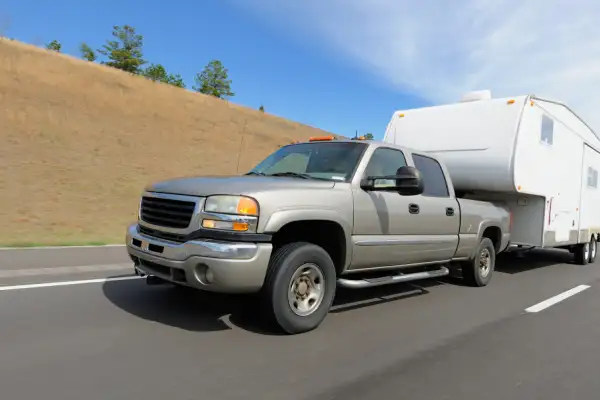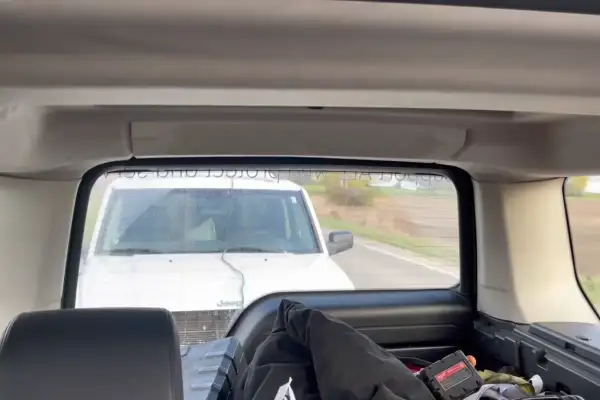Towing a trailer with a truck is a convenient way to transport goods or enjoy a vacation, but truck bounce is a common problem during heavy-duty towing. This is an unsettling experience where the trailer momentarily leaves the ground and lands back on its wheels.
This bouncing issue not only leads to discomfort but can also pose safety risks. Therefore, you must know how to eliminate truck bounce for a smooth towing experience.
Ensure the axles are properly balanced by placing heavy stuff there to eliminate this issue. Adjust tire pressure according to the manufacturer’s recommendations to optimize stability and performance. Also, check your truck’s suspension ratings to ensure they can handle the weight you tow.
The purpose of this article is to find solutions to the problem of truck bounce when towing. So keep reading to get your truck towing like a dream.
How to Eliminate Truck Bounce When Towing: 8 Checklist

To eliminate truck bounce when towing, there are several important things you need to pay attention to.
- Ensure proper weight distribution
- Adjust tire pressure
- Check suspension ratings
- Utilize a weight distribution hitch (WDH)
- Monitor weight ratings
- Choose a high-quality trailer
- Drive smoothly on the road
- Regular trailer inspection
1. Ensure Proper Weight Distribution
When heavy-duty towing, you should carefully distribute the load towards the front of the trailer, using at least 60% of the load weight. This is essential for maintaining stability and preventing the rear of the trailer from bouncing.
Also, you need to consider the tongue weight, which shouldn’t exceed 10-15% of the gross trailer weight. If your trailer weighs 5,000 pounds, the tongue should weigh between 500 and 750 pounds. To achieve this, you can adjust the placement of the load or use a weight distribution hitch.
If you are experiencing difficulties with proper weight distribution, you may need to contact a professional towing service. You can get valuable information from them in this situation.
2. Adjust Tire Pressure
To eliminate truck bounce when towing, check the tire pressure. It’s helpful to lower the tire pressure by half when towing an empty trailer, but it depends on the size and weight of the tire. Ensure that the tires aren’t overinflated or underinflated.
Overinflated tires can result in a harsh ride and increased bounce, while underinflated tires can cause excessive sidewall flex and reduced stability.
3. Check Suspension Ratings
Verify your suspension’s rating can handle the gross trailer weight when towing to eliminate truck bounce. Suspension ratings ensure your truck can safely handle the load you’re towing without compromising stability or causing excessive bounce.
Driving with an overloaded suspension can lead to poor handling, increased wear and tear on your vehicle, and potential safety hazards. Checking and ensuring that your suspension can handle the weight is crucial in eliminating truck bounce when towing.
4. Utilize a Weight Distribution Hitch (WDH)
To ensure optimal towing stability and eliminate truck bounce, you should utilize a weight distribution hitch (WDH) that evenly distributes the trailer’s weight across.
A weight distribution hitch transfers some of the trailer’s tongue weight to the front axle of your tow vehicle and the trailer’s axles, reducing the downward force on the rear axle. This helps to maintain a level ride height and prevents the rear of your truck from sagging.
5. Monitor Weight Ratings
Check your truck and trailer’s weight ratings to ensure they’re within the recommended limits. Adhere to your truck and trailer’s Gross Vehicle Weight Rating (GVWR) and Gross Axle Weight Rating (GAWR).
These ratings indicate that your vehicle’s maximum weight and components can be safely handled. Exceeding these limits can lead to instability, increased wear and tear, and potential accidents.
6. Choose a High-Quality Trailer
Choose a high-quality tow trailer, and prioritize features that minimize truck bounce and enhance stability. Look for trailers equipped with Torflex axles and rubber ride suspension systems. These suspension systems use rubber torsion instead of traditional leaf springs, providing a smoother ride and reducing bounce.
Also, consider trailers with a low center of gravity, which will help improve stability and reduce the chance of trailer sway. Look for trailers that have a sturdy construction, including a reinforced frame and durable materials.
7. Drive Smoothly on the Road
Be mindful of your driving habits to ensure a smooth towing experience and eliminate truck bounce. Smooth driving is imperative when towing, as sudden braking, acceleration, and sharp turns can cause the trailer to bounce. This is especially important in adverse weather conditions.
A gentle and predictable driving style can prevent trailer bounce and maintain stability. When approaching stops, brake gradually and give yourself plenty of time to slow down. Similarly, do so slowly and steadily when accelerating to avoid putting excessive strain on the trailer.
8. Regular Trailer Inspection
To ensure a smooth and stable towing experience, regularly inspect your trailer for any signs of rust, corrosion, damage, or improper weight distribution.
Start by checking the trailer frame for any signs of rust or corrosion, which can weaken the structure and lead to bouncing. Inspect the trailer hitch attachments to ensure they’re securely fastened and in good condition.
Why does my truck feel bouncy when I tow it?

If your truck feels bouncy when you tow, it may be due to an improper weight distribution in the trailer hitch. When the weight isn’t properly distributed, it can lead to an imbalance between the front and rear of the trailer. This imbalance causes the trailer to sway and bounce, affecting the truck’s stability.
When there isn’t enough weight in the tongue of the trailer, it can cause a bounce in the truck-trailer connection. Conversely, too much weight at the back of the trailer can cause a bounce at the rear.
Therefore, ensure proper weight distribution by adjusting the load and tongue weight to eliminate truck bounce when towing.
Can I eliminate truck squat while heavy towing?
When towing a heavy trailer, your truck may exhibit a phenomenon called truck squat, similar to bouncing. This can lead to several issues, including reduced handling and control, compromised suspension, and uneven tire wear.
To fix truck squats when towing, leaf springs are often considered one of the most cost-effective solutions. These are crucial components of a truck’s suspension system. They consist of multiple layers of spring steel or leaves stacked on each other.
When compressed, these leaves flex and absorb the added weight, helping maintain a stable truck bed. Also, ensure proper weight distribution in your trailer hitch and address any rear shocks or tire pressure issues to eliminate truck squatting during heavy towing.
Achieve a Smoother Towing Experience with Proper Preparation and Maintenance
Eliminating truck bounce when towing is achievable with proper preparation and maintenance. You can make your towing experience smoother and safer by paying attention to weight distribution, tire pressure, and suspension and using the right equipment.
Also, maintaining a smooth driving style, regularly inspecting your trailer, and purchasing a high-quality trailer contribute to a comfortable journey.
However, after following the solutions, if your truck continues to bounce during towing or finds your truck unsuitable for extensive towing, you should contact a professional towing service to assist you.
You can contact Santa Clara Towing Company for heavy-duty towing in Santa Clara and other locations at +669-228-5951, or you can e-mail at [email protected].
As the leading provider of reliable and experienced heavy-duty towing services in Santa Clara, they have a proven track record of providing high-quality services. Furthermore, they have offered 24/7 safe and trustworthy towing solutions for your convenience.
